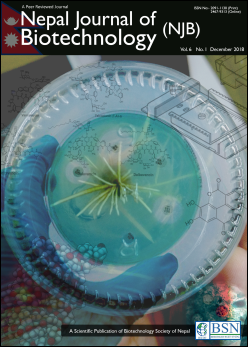In Vitro Comparative Study of Antioxidant and Antibacterial Activity of Selected Dietary Plants
DOI:
https://doi.org/10.3126/njb.v6i1.22336Keywords:
Antioxidant, Antimicrobial, Spectrophotometer and Well DiffusionAbstract
Ethanolic extracts of Garlic (Bulb), Aloe (leaf), Flower bud (buds), Turmeric (rhizomes) and Ginger (rhizomes) were used for relative analysis of antioxidant and antimicrobial activity. Antioxidant activity was determined by DPPH [1, 1-Diphenyl-2-picryl hydrazyl] assay and expressed with Ascorbic acid. It was observed that turmeric and ginger have more antioxidant activity than garlic, Aloe and Flower bud. These extracts were further studied for antibacterial activity by agar well diffusion and spectrophotometric method against tetracycline as reference. The result showed that Flower bud is more effective against Escherichia coli, Pseudomonas aeuroginosa, Bacillus subtilis and Staphylococcus aureus compared to other plants extract. However, all the plants extract did show antioxidant and antibacterial activity.
Downloads
Downloads
Published
How to Cite
Issue
Section
License
Copyright Notice:
The manuscript submitted to NJB must be an original contribution, not previously published and should not be under consideration for publication elsewhere. When the manuscript is accepted for publication, the authors agree to automatically transfer the copyright of the article to the publisher. It should grant permission to any third party, in advance and in perpetuity, the right to use, reproduce or disseminate your article, according to the NJB copyright and license agreement.
Authors transfer copyright to the publisher as part of a journal publishing agreement but have the rights to: Share their article for Personal Use, Internal Institutional Use and Scholarly Sharing purposes, with the NJB applies the Creative Commons Attribution-NonCommercial CC BY-NC license to all the works we publish after Jun 2020 (Before it was CC BY-NC-ND). Under this license, authors agree to make articles legally available for reuse, without permission or fees, for virtually any non-commercial purpose. Anyone may remix, adapt, and build upon your work non-commercially, and although their new works must also acknowledge you and be non-commercial, they don’t have to license their derivative works on the same terms. More details on CC BY-NC refer to its Licence Deed and Legal Code.






